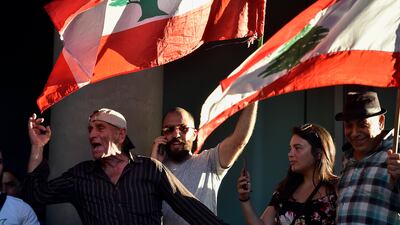Dozens of protesters angered by the rapid deterioration of living standards in Lebanon marched through the capital Beirut on Tuesday evening and attempted to break into the headquarters of MTC Touch, one of the two state-contracted telecoms companies.
The demonstrations, in which a handful of protesters clashed with security forces, came days after a major jump in the cost of phone and internet services — the latest price rise in a country suffering from inflation of more than 200 per cent.
To attend the protest, demonstrators Bassil Hatoum, Maan Moghrabi and Yaman Moghrabi had to split the petrol bill on their way from Kfar Silwan, a village more than an hour away from Beirut.
“We can't afford to get here without splitting it. And that’s just us,” said Mr Hatoum, a 27-year-old music manager.
“Imagine all the people who can’t afford to come to these protests because they can’t afford the petrol to get here.”
Lebanon’s economic collapse, which began in 2019, has caused about 80 per cent of Lebanon’s population to slip below the poverty line.
Dire shortages of basic goods and services have plagued the state in the years since. State electricity is nearly nonexistent, so the majority of Lebanon’s population relies on expensive private generator subscriptions for backup electricity. These are powered by diesel, itself often a scarce commodity in the troubled nation.
Water, bread, fuel and medicine are also often in short supply and the local currency has plunged in value by more than 90 per cent.
“They’ve brought us to below poverty and somehow they’re still in power,” Mr Hatoum said, referring to Lebanon’s political elite, many of whom transition from their roles as warlords during the country's civil war — which ended 30 years ago — to national leaders.
Mr Hatoum described them as “mafia leaders”.
“They’re experts at staying in power through clientelism,” 32-year-old Mr Moghrabi, another of the protesters, added.
“No one is comfortable, except for those with money or people who benefit directly from having the political class in power.”
Protesters said the march, which also stopped at the Association of Banks in Lebanon, was the first in a new wave of demonstrations against the economic crisis and the ruling class.
“The situation is getting worse and worse. They are making the people carry the brunt of the crisis, whether it’s from electricity, gas, diesel, telecoms, deposits,” Fouad Debs, from the Depositors Union, told The National.
Commercial banks in 2019 imposed capital controls on small depositors, barring access to dollars and only allowing them to retrieve their money in Lebanese pounds at vastly reduced rates.
Mr Debs said “people’s life savings have been stolen”, hence the anger at the Association of Banks in Lebanon on Tuesday night.
Protests in October 2019, which were sparked over a proposed tax on the usage of WhatsApp, later led to nationwide protests against Lebanon’s ruling class and the collapse of the government.
And Mr Debs said that, while the protests were not exclusively linked to the telecoms rate increase, it was certainly a factor.
“If you keep on adding straw to the camel's back, [the telecoms price hike] was another one.”
Reforms necessary for unlocking billions of dollars in international aid have yet to be enacted, agreement over a financial recovery road map has dragged and a bailout by the International Monetary Fund remains a long way off.
For Mr Debs and the three young protesters from Kfar Silwan, this demonstration was the first of several. They all expressed hopes that small protests happening across the country would gain momentum.

